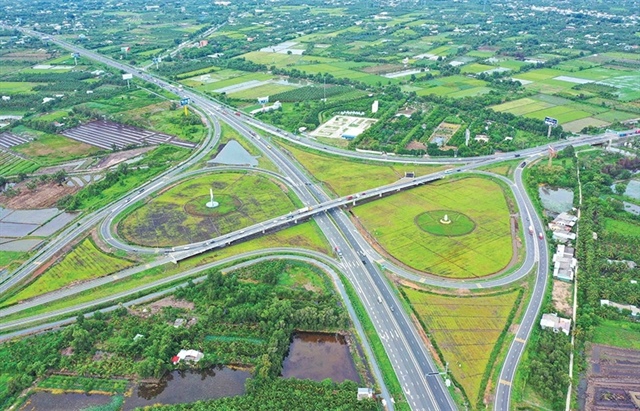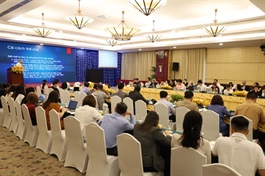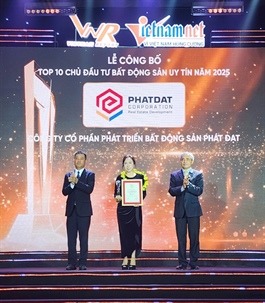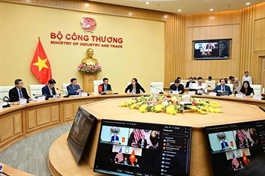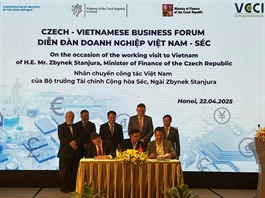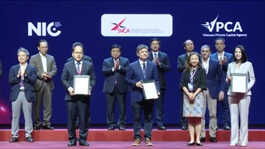Vietnam strengthens 5G to unlock digital economy
Vietnam strengthens 5G to unlock digital economy
The Asia-Pacific’s digital transformation landscape is witnessing Vietnam steadily asserting its position as a rising force, drawing recognition from global industry players.
At a conference which was co-hosted by mobile organisation GSMA and the Vietnam Digital Communication Association in Hanoi last week, senior industry leaders, policymakers, and global tech experts gathered to explore strategic pathways to accelerate Vietnam’s digital transformation.
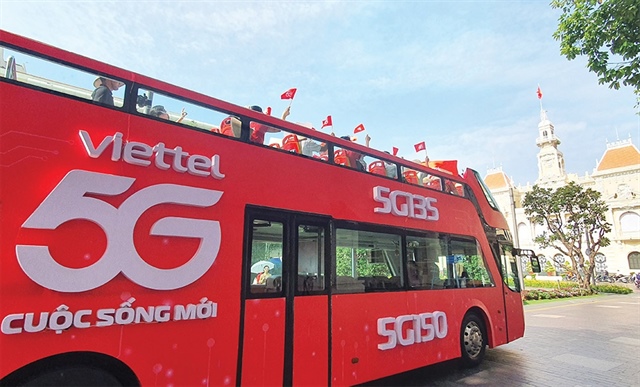
Vietnam strengthens 5G to unlock digital economy |
The discussion placed particular emphasis on building a robust, modern, and sustainable digital ecosystem, one capable of supporting inclusive economic growth and long-term innovation. According to GSMA, Vietnam’s proactive engagement in these regional dialogues reflects its growing influence in shaping the future of connectivity in Asia-Pacific.
Julian Gorman, GSMA’s head of Asia-Pacific, underscored Vietnam’s strategic vision in advancing its digital economy.
“Vietnam was not the first country to launch 5G, but it has the vision and commitment to be among the top nations in this field,” Gorman said. “With GSMA, Vietnam now has a truly significant and increasingly position in shaping the global mobile ecosystem.”
He further highlighted that Vietnam’s government has demonstrated both strategic foresight and operational decisiveness in creating an enabling environment for digital development. “Vietnam’s rise is the very reason GSMA chose to host its event here, to present Vietnam as a model for other countries shifting from traditional to digital processes,” he said.
A major focus at the conference was Vietnam’s push to strengthen its own technology capabilities as a way to build long-term digital independence. Viettel Group, for example, has mastered core 5G network technology. Additionally, promising results in research and development of Open RAN, a strategic direction that enhances telecommunications infrastructure autonomy while reducing dependence on foreign vendors, has enabled the group to take control of both hardware and software.
Nguyen Dat, deputy general director of Viettel Group, shared the ambition that by 2026, 5G coverage would match that of 4G today, implying that both urban and rural areas would be equipped with state-of-the-art 5G devices, ensuring high performance and readiness for next-generation digital services.
“This goal ensures that all citizens have access to technology, regardless of location, helping to close the digital divide in Vietnam and striving towards the aim of the digital economy contributing 30 per cent of Vietnam’s GDP by 2030,” Dat said.
Tran Van Tung, deputy director of the Broadband Wireless Research Centre at Viettel High-Tech, said, “Mastering both hardware and software puts Viettel among the few telecom operators globally capable of independently deploying a comprehensive 5G ecosystem. Building on this solid foundation, Viettel is moving towards advanced 5G and 6G within the next five years.”
Other multinational technology players are also showing strong confidence in Vietnam’s 5G capability.
Rita Mokbel, president of Ericsson Vietnam, stated that what is happening in Vietnam is part of a broader global shift, and the changes anticipated over the next five years, both worldwide and in Vietnam, will be profound.
“Vietnam is already making significant progress. All major network operators have commenced 5G trials or early rollouts. The steady progress reflects Vietnam’s strategic intent to become a digital-first economy,” she said.
Mokbel emphasised that the technology’s value extends far beyond faster download speeds or improved video streaming
“The real value lies in 5G’s potential to drive national digital transformation, enhance industrial productivity, and foster innovation across sectors, from agriculture and healthcare to manufacturing and smart cities,” she added. “Our goal is to help customers transition smoothly from 4G to 5G, not only by improving network performance, but also by enabling them to unlock new value.”
Vietnam’s mobile connectivity development is underpinned by a broader digital transformation agenda. According to GSMA, Vietnam is witnessing exceptional growth in mobile services and may soon become a leading digital nation in Asia-Pacific, thanks to high smartphone penetration, strong connectivity, and supportive policy frameworks.
The National Digital Transformation Programme aims to place Vietnam among the world’s top 30 digital nations by 2030, with ambitious objectives such as nationwide 5G and fibre-optic coverage, the development of over 100,000 digital technology enterprises, and a digital workforce of 1.5 million people.
Vietnam is also among the nations deploying Internet Protocol version 6, a network-layer protocol that facilitates online communication, with 55 per cent of users connecting via this standard. GSMA considers this a strong indicator of robust digital infrastructure readiness. Technologies such as AI, 5G, and Open Gateway are being rolled out, poised to reshape industries, enhance public services, and bridge the gap between urban and rural areas.
|
Terence Wong, head of Asia-Pacific GSMA Our 5G Industry Community was established over three years ago to accelerate 5G-driven transformation across ASEAN and the broader Asia-Pacific. What began as a focus on general-band Internet of Things has evolved into a powerful platform connecting over 1,000 organisations, ranging from governments to telecom operators, working to localise and scale 5G across industries such as manufacturing, logistics, healthcare, mining, smart cities, and public safety. Vietnam is one of the priority markets. With its fast-growing digital economy and strong industrial base, there is clear potential to deploy 5G in smart factories, ports, and energy infrastructure. But localisation is key, what works in Indonesia or Thailand may not apply directly to a Vietnamese context. That’s why we collaborate with local mobile operators and talent to build tailored ecosystems, not just infrastructure. We’ve seen national alliances in Malaysia, Singapore, and Indonesia setting up 5G innovation labs. These hubs bring local stakeholders together to co-create solutions, and we believe Vietnam is well positioned to do the same. Our platform is open and free to join, helping innovators in Vietnam gain visibility across ASEAN and even at global events like MWC Barcelona. We also support education and policy alignment. In Indonesia, for instance, we partnered with several ministries to accelerate 5G awareness in mining and manufacturing. In Singapore, 5G is already being used in operating rooms to enhance surgery outcomes. Public safety applications are growing too, replacing outdated systems with real-time AI-enabled mobile broadband solutions. So far, our community has documented over 30 regional 5G use cases, from smart firefighting in Hong Kong to maritime 5G connectivity in Macau. We stand ready to work with Vietnamese authorities and businesses to accelerate digital transformation through 5G, and help Vietnam become a leader in this space. Nguyen Phong Nha, deputy director general Vietnam Telecommunications Authority Vietnam’s ICT sector stands at a critical turning point. With strong government commitment, dynamic private sector innovation, and increasing international cooperation, we are steadily advancing towards our national vision of a digital government, a digital economy, and a digital society. In recent years, our digital infrastructure has grown rapidly. The rollout of 5G networks, expansion of data centres, and advancement in cloud computing are laying the groundwork for long-term digital development. We are also placing strong emphasis on digital platforms, AI applications, and cybersecurity as key enablers of transformation in vital sectors such as healthcare, education, agriculture, and manufacturing. Vietnam’s telecommunications infrastructure is being improved every day to meet the growing demands of a fast-evolving digital economy. Over the past years, broadband services have seen strong development. To date, more than 318,000 base transceiver stations have been deployed, enabling nearly all the population to access mobile broadband technologies. Currently, 5G coverage reaches around 25 per cent of the population. In particular, throughout 2025, tens of thousands of new base transceiver stations will continue to be rolled out by Vietnam’s three major telecom providers. This is expected to meet the rising demand for broadband and unlock the full potential of 5G tech. Rajeshwari Kanesin, regional head for Asia-Pacific apoQlar Medical Hospitals today manage vast amounts of data, such as CT scans, that can be several gigabytes in size. The challenge lies in processing this data quickly, with minimal latency, to facilitate accurate diagnostics and effective treatments. XR technologies enable a 3D, immersive experience for doctors, essentially providing them with a “Google Maps” of the human body. Coupled with AI, this helps enhance imaging, such as identifying bone structures, arteries, and tissues, making diagnoses more precise. In practice, these tools have shown immense potential in improving surgical outcomes. For example, in Singapore, doctors can simulate surgeries to plan procedures in advance, ensuring more accurate and less invasive interventions. One notable case involved liver transplants, where simulations allowed doctors to precisely match organs to patients, significantly reducing the complexity of the procedure. Furthermore, this tech extends to remote healthcare, enabling surgeons to collaborate across borders. In one case, doctors in Singapore guided a surgery in Ghana via real-time video, demonstrating potential for global collaboration. As these technologies become commercially available, their adoption is set to grow, transforming healthcare delivery not only in urban centres but also in rural regions, providing better access to medical expertise and improving patient outcomes. |
- 14:29 25/04/2025






